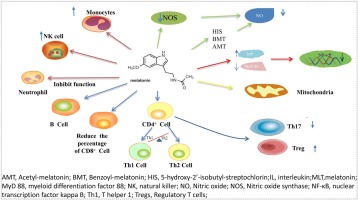当前位置:
X-MOL 学术
›
Cytokine Growth Factor Rev.
›
论文详情
Our official English website, www.x-mol.net, welcomes your feedback! (Note: you will need to create a separate account there.)
Potential role of melatonin in autoimmune diseases.
Cytokine & Growth Factor Reviews ( IF 13.0 ) Pub Date : 2019-07-16 , DOI: 10.1016/j.cytogfr.2019.07.002 Chan-Na Zhao 1 , Peng Wang 1 , Yan-Mei Mao 1 , Yi-Lin Dan 1 , Qian Wu 1 , Xiao-Mei Li 2 , De-Guang Wang 3 , Callan Davis 4 , Wenbiao Hu 4 , Hai-Feng Pan 1
Cytokine & Growth Factor Reviews ( IF 13.0 ) Pub Date : 2019-07-16 , DOI: 10.1016/j.cytogfr.2019.07.002 Chan-Na Zhao 1 , Peng Wang 1 , Yan-Mei Mao 1 , Yi-Lin Dan 1 , Qian Wu 1 , Xiao-Mei Li 2 , De-Guang Wang 3 , Callan Davis 4 , Wenbiao Hu 4 , Hai-Feng Pan 1
Affiliation

|
Autoimmune diseases are a broad spectrum of disorders involved in the imbalance of T-cell subsets, in which interplay or interaction of Th1, Th17 and Tregs are most important, resulting in prolonged inflammation and subsequent tissue damage. Pathogenic Th1 and Th17 cells can secrete signature proinflammatory cytokines, including interferon (IFN)-γ and IL-17, however Tregs can suppress effector cells and dampen a wide spectrum of immune responses. Melatonin (MLT) can regulate the humoral and cellular immune responses, as well as cell proliferation and immune mediators. Treatment with MLT directly interferes with T cell differentiation, controls the balance between pathogenic and regulatory T cells and regulates inflammatory cytokine release. MLT can promote the differentiation of type 1 regulatory T cells via extracellular signal regulated kinase 1/2 (Erk1/2) and retinoic acid-related orphan receptor-α (ROR-α) and suppress the differentiation of Th17 cells via the inhibition of ROR-γt and ROR-α expression through NFIL3. Moreover, MLT inhibits NF-κB signaling pathway to reduce TNF-α and IL-1β expression, promotes Nrf2 gene and protein expression to reduce oxidative and inflammatory states and regulates Bax and Bcl-2 to reduce apoptosis; all of which alleviate the development of autoimmune diseases. Thus, MLT can serve as a potential new therapeutic target, creating opportunities for the treatment of autoimmune diseases. This review aims to highlight recent advances in the role of MLT in several autoimmune diseases with particular focus given to novel signaling pathways involved in Th17 and Tregs as well as cell proliferation and apoptosis.
中文翻译:

褪黑激素在自身免疫性疾病中的潜在作用。
自身免疫性疾病是涉及T细胞亚群失衡的广泛疾病,其中Th1,Th17和Treg的相互作用或相互作用最为重要,从而导致炎症延长和随后的组织损伤。致病性Th1和Th17细胞可以分泌标志性促炎细胞因子,包括干扰素(IFN)-γ和IL-17,但是Tregs可以抑制效应细胞并抑制广泛的免疫反应。褪黑激素(MLT)可以调节体液和细胞的免疫反应,以及细胞增殖和免疫介质。用MLT治疗直接干扰T细胞分化,控制致病性T细胞和调节性T细胞之间的平衡,并调节炎症性细胞因子的释放。MLT可以通过细胞外信号调节激酶1/2(Erk1 / 2)和视黄酸相关的孤儿受体-α(ROR-α)促进1型调节性T细胞的分化,并通过抑制ROR抑制Th17细胞的分化-γt和ROR-α通过NFIL3表达。此外,MLT抑制NF-κB信号通路以降低TNF-α和IL-1β的表达,促进Nrf2基因和蛋白质的表达以减少氧化和炎症状态,并调节Bax和Bcl-2减少凋亡。所有这些都减轻了自身免疫性疾病的发展。因此,MLT可以作为潜在的新治疗靶标,为自身免疫性疾病的治疗创造机会。
更新日期:2019-11-18
中文翻译:

褪黑激素在自身免疫性疾病中的潜在作用。
自身免疫性疾病是涉及T细胞亚群失衡的广泛疾病,其中Th1,Th17和Treg的相互作用或相互作用最为重要,从而导致炎症延长和随后的组织损伤。致病性Th1和Th17细胞可以分泌标志性促炎细胞因子,包括干扰素(IFN)-γ和IL-17,但是Tregs可以抑制效应细胞并抑制广泛的免疫反应。褪黑激素(MLT)可以调节体液和细胞的免疫反应,以及细胞增殖和免疫介质。用MLT治疗直接干扰T细胞分化,控制致病性T细胞和调节性T细胞之间的平衡,并调节炎症性细胞因子的释放。MLT可以通过细胞外信号调节激酶1/2(Erk1 / 2)和视黄酸相关的孤儿受体-α(ROR-α)促进1型调节性T细胞的分化,并通过抑制ROR抑制Th17细胞的分化-γt和ROR-α通过NFIL3表达。此外,MLT抑制NF-κB信号通路以降低TNF-α和IL-1β的表达,促进Nrf2基因和蛋白质的表达以减少氧化和炎症状态,并调节Bax和Bcl-2减少凋亡。所有这些都减轻了自身免疫性疾病的发展。因此,MLT可以作为潜在的新治疗靶标,为自身免疫性疾病的治疗创造机会。


























 京公网安备 11010802027423号
京公网安备 11010802027423号